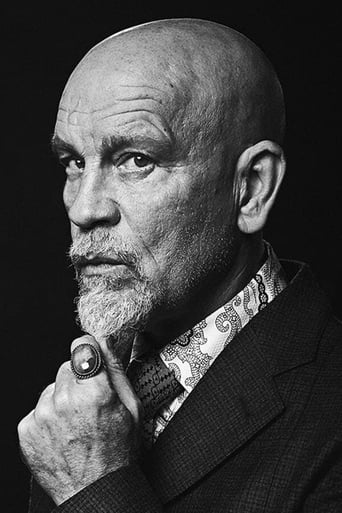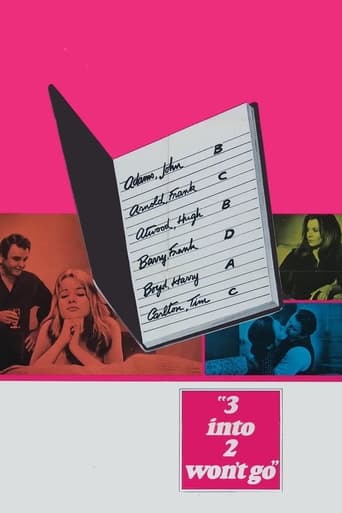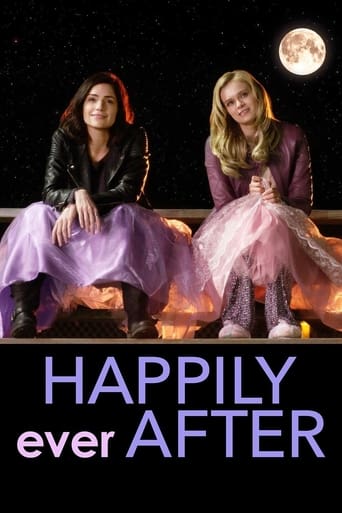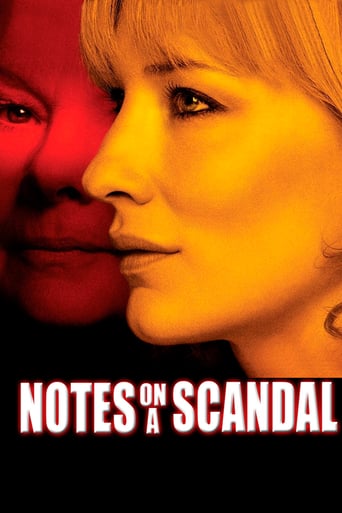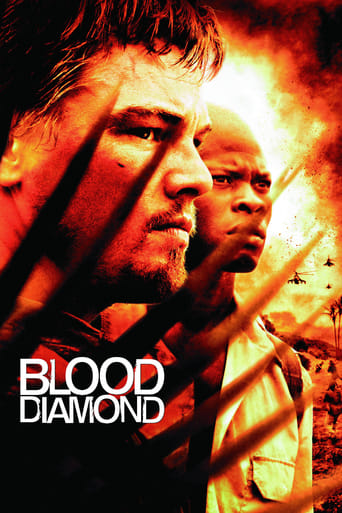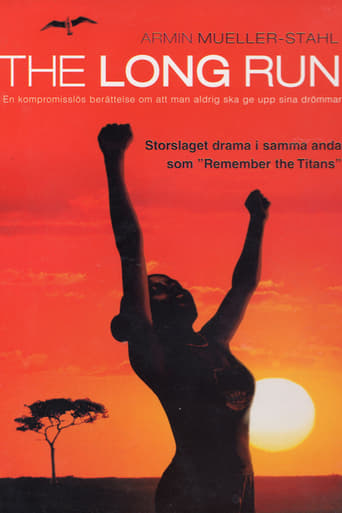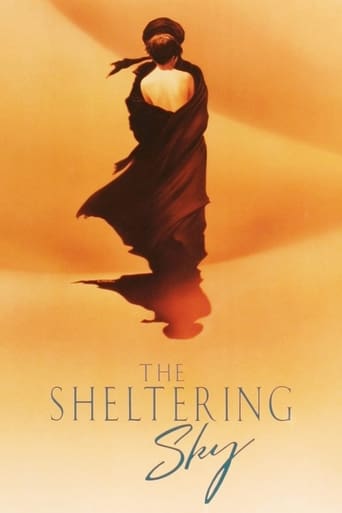
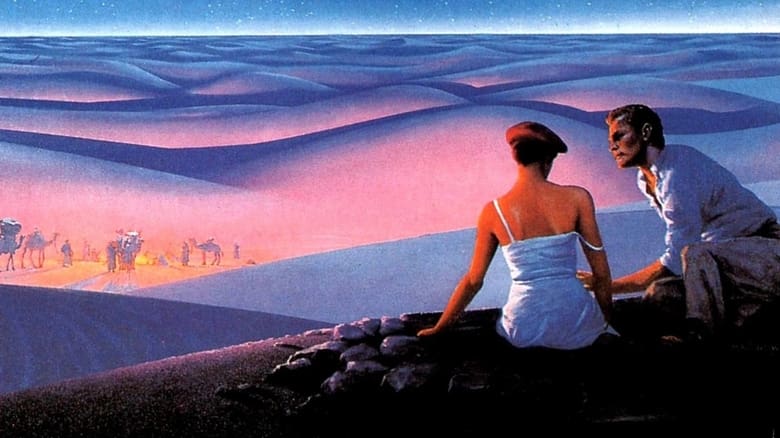
The Sheltering Sky (1990)
An American couple drift toward emptiness in postwar North Africa.
Watch Trailer
Cast
Similar titles

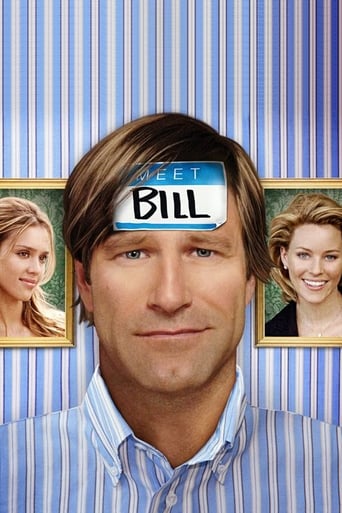
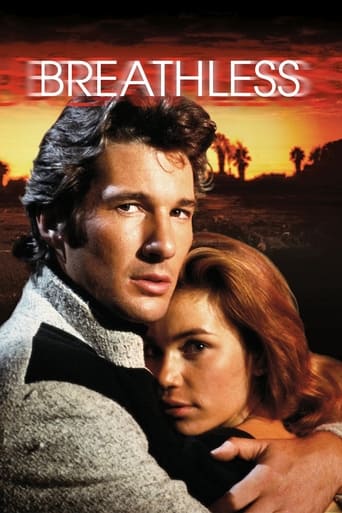
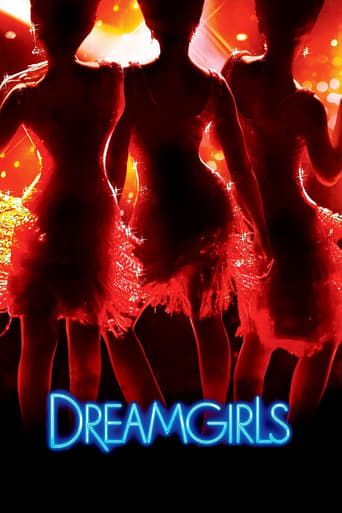

Reviews
Nice effects though.
Great Film overall
Easily the biggest piece of Right wing non sense propaganda I ever saw.
One of the film's great tricks is that, for a time, you think it will go down a rabbit hole of unrealistic glorification.
With more than a touch of LAWRENCE OF ARABIA about it, in its use of stunningly photographed sequences in the Sahara Desert, THE SHELTERING SKY is a sympathetic study of three characters burdened by emotional as well as physical baggage. Director Bernardo Bertolucci includes several sequences of Port Moresby (John Malkovich), his wife Kit (Debra Winger), and their acquaintance George Tunner (Campbell Scott) packing and unpacking their massive trunks as they move from place to place; their cumbersome lifestyles contrasting starkly with those of the local inhabitants. The contrast is emphasized later on in the film, when Kit travels alone across the desert with a group of nomads who manage to carry everything on their camels' backs. The emotional baggage that blights the protagonists' lives manifests itself in a restless desire to move from place to place; it seems that Port will never be happy anywhere. He is perpetually in search of something, but has little or no idea what it is; the only way he can deal with this is to indulge in visceral pleasures such as spending a night with a prostitute just outside Tangier, or paying some locals to make music while he lies sick on the ground with typhoid fever. Kit seems to be more level-headed, but even she sacrifices her self-control in favor of sexual gratification while imprisoned by the nomads. The film begins with Port insisting that he and his wife, unlike Tunner, are "travelers," not "tourists": whereas Tunner might be likely to return home after a period of time, Port and Kit are sufficiently au fait with African life to stay much longer - maybe even live there permanently. As the action unfolds, however, we understand that this is nothing more than an empty statement: Port and Kit will always remain outsiders, not so much because of their skin color, but because they are unable to adapt themselves to the rhythms of African life. They will always remain outsiders. Tunner remains a peripheral figure; while trying his best to conduct a clandestine love-affair with Kit, it's clear that he does not understand how African life, if lived to the full, can prove a life-changing experience. This is illustrated in the film's final moments where he hopes that Kit will be restored to him, yet discovers to his cost that she has wandered off.The author of the source-text Paul Bowles appears in the film, as well as acting as an off-screen narrator. While sympathizing with his characters, it's clear that he is as much of an outsider as Kit; he sits on his own in a Tangier café, observing what is going on without becoming involved. He pronounces judgment on the characters' foibles, yet seems unable (or unwilling) to offer any solution to their emotional predicament. Perhaps there is no solution - as a long-time resident of Tangier, as well as other places in Africa, Bowles was well-placed to understand precisely how westerners could (or could not) adapt to unfamiliar surroundings.THE SHELTERING SKY is not without its orientalist elements: the nomad men are portrayed as savage, enjoying the unexpected pleasure of a white woman in a plot-line that would not seem out of place in early twentieth century "White Sheik" romances that proved so popular with western audiences. On the other hand, Bertolucci seems determined to treat his characters sympathetically, as people quite literally swallowed up by the desert landscape. This is underlined in several shots where the protagonists are shown in long-shot set against the desert, mere specks on the horizon.
A film is made of: story, direction, acting, location, music, photography. In all of these aspects, I think that the rating of "sheltering sky" is high; hence, the movie is good. Yes the story plot may be the weaker aspect, but this deserves an explanation.After becoming a Hollywoodian director, Bernardo felt the need of coming back to his origins, and asking for nothing ... His international career started with "Last Tango in Paris" (1972), and in a certain sense, Sheltering Sky is the other side of it. While Last Tango (an original story by Bertolucci) was urban, claustrophobic and obsessive; Sheltering Sky is open space, elusive and without a precise direction. Bertolucci said "I wanted to follow the loose style of Antonioni" (both come from the same region Emilia, in north Italy). Indeed the film resembles l'Avventura" (where a person disappeared) or the "Passenger" (filmed in the desert) both directed by Michelangelo.As I said, Sheltering Sky is the other side of Last Tango, but it shares similar (good) ingredients: good actors (John and Debra in place of Marlon Brando), good soundtrack (Sakamoto in place of Gato Barbieri), very good photography (Storaro, already present in Tango). As for Antonioni's films, Sheltering is not for simple entertainment, but its value will grow over time.
Two post-WWII Manhattan sophisticates who travel to avoid standing still embark on a soul-searching expedition into the Sahara Desert, where the beautiful but desolate landscapes provide a mirror to their own troubled relationship. The film is nothing if not exotic, presenting some of the purest visions of the desert since Peter O'Toole first rode a camel in 'Lawrence of Arabia'. But the scenario works best when presented as an ethnic travelogue, ushering viewers into an utterly foreign world. The messy marital plot conflicts are, by comparison, all rather vague, especially after Debra Winger goes native in a Bedouin harem. The story never really finds an ending, because there isn't anything to resolve: the characters all exist in a (handsomely photographed) vacuum, and their motivations are even more mysterious than the Arab culture surrounding them. The intrusive (and, as usual, unnecessary) voice-over narration is by novelist Paul Bowles himself, briefly glimpsed in the film's opening scenes.
The movie, I gather, is supposed to be about the eroding marriage of Kit (Winger) and Port Moresby (Malkovitch). Port Moresby? The writer of the novel, Paul Bowles, surely meant it as a joke but although I get the joke I didn't get the point.In fact, the point of the entire film was pretty much lost on me. Winger and Malkovitch arrive to do some touring in North Africa. Come wiz me to zah Casbar. And tell us where Rick's Cafe is located. Right. There is a hanger-on whom they've met on their journey, Scott Campbell. The trio do their best to make themselves at home in the strange city full of strange streets. They stay in a crummy hotel. They wander about and drink tea. No booze in Islamic countries, though my informants asseverate that there is usually some dynamite hash to be had.But if the point of the story is that Kit and Port feel their marriage dissolving, and that they're searching for something that will restore meaning to their bond, there's not much evidence of it. Yes, Port sleeps with a seductive and treacherous hooker. And Winger and Scott spend the night together after a debauch. But there's nothing to indicate that these were more than errant acts based on impulse, nothing resembling a recurring pattern. Kit and Port don't fight; they hardly argue. They may not be especially bright but they're not soulless either.They leave the city and travel to a smaller and shabbier tourist town. They manage to dump Scott somewhere. Then they board an overcrowded third-world bus and wind up with Port dying of some unidentified disease, a victim of the epidemic that has caused the closing of the only respectable hotel in town.She leaves his body on the floor mattress and wanders off into the desert's fringe, where she is offered a ride by some spooky looking nomads, who turn out to be reasonably human after all. They take her to a village compound made up of some unworldly looking multi-story adobe structures. Winger stays with the young head honcho for a while, getting to know him in a Biblical sense, until the other ladies begin to resent her presence and throw her out. She winds up at a Western outpost, tattooed but saved.Bowles, the author, makes small appearances at the beginning and the end of Winger's journey, voicing some pieces of narrative from the novel, which I didn't find enlightening. Somerset Maugham used to do it better.Bonus points for the photography. Bernardo Bertolucci may have let the story get away from him but he's got the desert and its denizens down pat. Some of the shots are extremely impressive, the ones that don't look like Bakersfield or Deming. Timbuktu, I was surprised to learn, is a small but flourishing city rather than a caravansary, no longer just Timbuk One. Another joke the point of which eludes me. If Terence Malick had been behind the camera there would have been inserts of the fauna, little lizards skittering around or a sawscale viper or something. Decent performances too.The first time I saw this I was swept up in the tale because I was curious about seeing where it would go, and then found myself engaged with the characters. It doesn't hold up as well on a second viewing. The mystery, what there was of it, is over.

